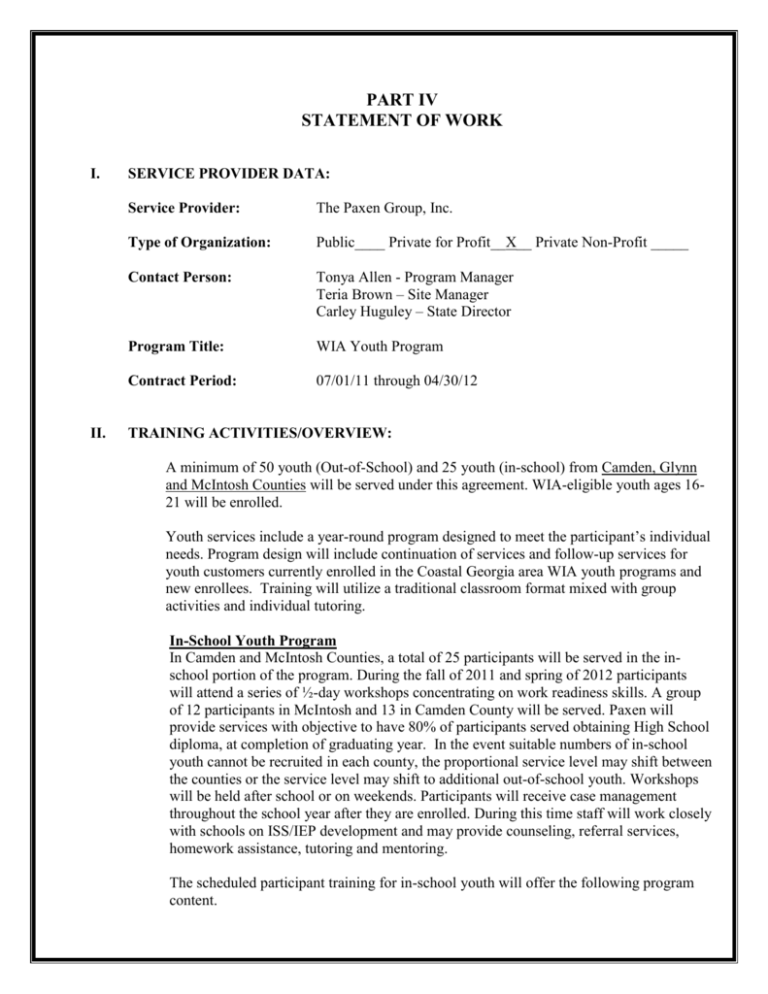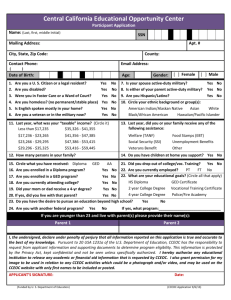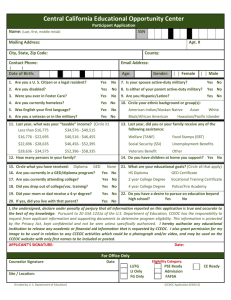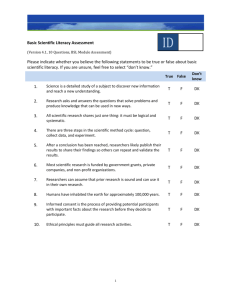SOW CGMcI Rewrite PY11
advertisement

PART IV STATEMENT OF WORK I. II. SERVICE PROVIDER DATA: Service Provider: The Paxen Group, Inc. Type of Organization: Public____ Private for Profit__X__ Private Non-Profit _____ Contact Person: Tonya Allen - Program Manager Teria Brown – Site Manager Carley Huguley – State Director Program Title: WIA Youth Program Contract Period: 07/01/11 through 04/30/12 TRAINING ACTIVITIES/OVERVIEW: A minimum of 50 youth (Out-of-School) and 25 youth (in-school) from Camden, Glynn and McIntosh Counties will be served under this agreement. WIA-eligible youth ages 1621 will be enrolled. Youth services include a year-round program designed to meet the participant’s individual needs. Program design will include continuation of services and follow-up services for youth customers currently enrolled in the Coastal Georgia area WIA youth programs and new enrollees. Training will utilize a traditional classroom format mixed with group activities and individual tutoring. In-School Youth Program In Camden and McIntosh Counties, a total of 25 participants will be served in the inschool portion of the program. During the fall of 2011 and spring of 2012 participants will attend a series of ½-day workshops concentrating on work readiness skills. A group of 12 participants in McIntosh and 13 in Camden County will be served. Paxen will provide services with objective to have 80% of participants served obtaining High School diploma, at completion of graduating year. In the event suitable numbers of in-school youth cannot be recruited in each county, the proportional service level may shift between the counties or the service level may shift to additional out-of-school youth. Workshops will be held after school or on weekends. Participants will receive case management throughout the school year after they are enrolled. During this time staff will work closely with schools on ISS/IEP development and may provide counseling, referral services, homework assistance, tutoring and mentoring. The scheduled participant training for in-school youth will offer the following program content. Fall ’11 and Spring ’12 About Face Learning Modules Interpersonal & Group Dynamics Computer Literacy Core Basic Work Skills Critical Thinking Skills Pregnancy Prevention Business Perspectives Exploring Careers Effective Employee Skills Job Searching Skills Life Skills Training Schedule and Activities Participants will attend a total of 32 sessions of training after regular school hours twice per week. Each session will be 2-2.5 hours in length. If necessary, modifications to this schedule may occur with prior knowledge and approval of Coastal Workforce Services. All changes in scheduling will be forwarded to Coastal Workforce. Out of School Youth Program Paxen will provide comprehensive WIA services to 40 out of school youth in Chatham County. The targeted youth will be 18 – 21 year old high school dropouts. The emphasis of the program will be GED preparation leading to attainment of a GED. This program will be built around Paxen’s innovative GED Xcelerator design. Paxen will obtain GEDs on 26 of 40 enrolled to meet contracted credential rate of 64.5% Released in March 2009, the GED Xcelerator program and curricula is built upon the innovative GED Plus program that Paxen delivers for the National Guard Bureau. The 10-book GED Xcelerator series provides an intense, accelerated approach to test preparation that equips learners with the essential skills and strategies to succeed on the GED Tests. Unlike traditional materials, which were designed for the classroom, Xcelerator has been designed from the classroom, using proven educational theory and cutting-edge classroom philosophy. In further contrast to other GED programs and product lines, which take months to teach the GED Tests through a content-based approach, Xcelerator gets to the heart of the GED Tests—and fast—by emphasizing concepts. Learners who study with Xcelerator prepare for the tests in a fraction of the time—a matter of weeks rather than months—and succeed on them at a rate that far exceeds the national average. Describe how the following activities will be performed A. Outreach/Recruitment/ Intake/ Initial Eligibility and Assessment: Outreach and Recruitment Recruiting efforts will begin immediately upon contract approval, and will be coordinated by the Program Manager. Any necessary advertisements, handouts, flyers, and informational packets will be provided by Paxen’s marketing staff and will list the CWIB as the program sponsor. Promotional items need prior approval by CWIB. Appropriate actions will be taken to inform community-based organizations, government agencies, and public of opportunities available. Formal presentations will be given to local government agencies, educational institutions, and service groups to seek their cooperation in referring participants to the program. Media-related activities such as newspaper ads, flyers, and public service announcements will be used to inform the public as necessary. The responses to advertising (and the results of all contacts) will be charted weekly to ensure that the required numbers of participants are enrolled in the program. Charts will be provided to CWS for review during onsite monitoring visits. Participant Intake and Assessment All potential applicants will be provided information on the full array of services available as well as the intake criteria needed to qualify for the program. Potential participants will be interviewed to verify that each meets WIA qualifications. B. Eligibility Certification/Enrollment: Once WIA intake and status forms are completed and eligibility documentation is obtained, copies of participant forms will be used for data entry into GWS. Prior to data entry, each eligibility file will be thoroughly reviewed by program staff to ensure compliance with the WIA eligibility guidelines. All applicants will be certified as eligible for WIA services prior to receiving any training in the program. C. Testing and Additional Assessment: Assessment will be administered during the initial orientation and prior to exit. Assessment tools will include the following: The Test for Adult Basic Education (TABE) is used at entry to measure initial grade levels for reading and math and post-program to measure grade gains. Out of School youth who are assessed as Basic Skills Deficient will be TABE tested quarterly to document Numeracy/Literacy Gains. Career Occupational Preference Survey (COPS), which assesses career interests, is used in career plan development. Keirsey Temperament Sorter®-II is used to assess personal strengths and weaknesses and personality traits. Assessment results will be documented in each participant’s file for easy review and monitoring. All information gathered will be used to enhance counseling activities based on each participant’s Individual Service Strategy (ISS). D. Counseling All Paxen personnel will be trained in counseling techniques during staff training conducted by Paxen corporate personnel. These techniques will be used throughout the program and will be reality-based, objective, and reflective of each individual participant’s verbalized goals and actions. The ISS will assist the participants in realistically assessing their abilities, needs, and potential. The information gathered through assessments will be used during face-to-face counseling sessions because those scores reflect the participant’s potential academic and work place performance as compared to the general population and, therefore, provide the participant with a realistic picture of his or her standing in relation to others. Discussion of assessment results also increases participant understanding of the requirements for performing successfully on the job. All assessment and counseling information will be documented in writing by the Instructor, Case Manager or other appropriate staff person. Counseling notes will be maintained in the participant's file and will be updated regularly. E. Participant Contact Participant contact will include counseling appointments, regular visits to worksites and support with work-related problems, telephone and email contact, at-home visits, and other correspondence. Mentoring services are ordinarily provided by adult volunteers from various community organizations. Participants will be encouraged to maintain close contact with Paxen staff along with mentors, and these relationships will be nurtured to establish contact with trust. Additional contacts during times of stress (e.g., pre-interview or evaluation), and recognition of participant success (via incentives, congratulatory messages, etc.) will further strengthen these bonds. F. Computer Technology Equipment and services are made available to participants for programs that incorporate online components. Participants will have computer lab available for use throughout program. This will enhance work readiness component by allowing participants opportunity to develop resumes, determine high interest occupational areas via assessments and expand their job search to include internet based searches. These service enhancements will be coupled with site visits to local Career Centers. G. Job Development/Job Placement The Individual Service Strategy (ISS) will indicate the participant's qualifications, abilities, and employment goals. Participants will interact with the Program Manager to discuss employment opportunities based on assessments and counseling provided by the Instructor. Job development and placement activities will be primarily the responsibility of the Program Manager. Job development activities targeted at local employers may include, but will not be limited to, personal contact, advertising, online job searches, brochures, fliers, direct mail, presentations, job fairs, focus groups, other forms of networking, referrals, etc. When employers are contacted, Paxen staff will describe in detail the training the individual has received and will highlight the numerous advantages offered (by the employee and the program) to an employer who is willing to hire from within the WIA program. All job development activity will be logged to establish proof of contact. Logs will be available to CWS staff for review at monitoring visits. The process for tracking participants to determine readiness for job placement will be the joint responsibility of the Instructor, Case Manager, Site Manager and Project Manager and documented in counseling notes. Paxen will provide work readiness curriculum completed based on competency rating. Modules include effective job search, resume writing, and career exploration. This will be completed by Paxen staff with all participants who are enrolled in services and attending training. The ISS will indicate the projected end dates for individual training and then will determine, through regular counseling, if the projected schedule is being followed and the point at which job placement activities should begin. H. Support Payments to Participants Transportation to and from the program will be provided as needed and in accordance with local policies in place with Coastal Workforce Investment Board. Supportive Services Payments are based on needs of participants. Supportive Service payments are provided directly or through referral to other agencies. Paxen will coordinate with many local organizations to facilitate a two-way referral network for program applicants and participants in need of services beyond those offered by the program. Examples might include referrals to shelters, public assistance, medical services, counseling programs, food banks, crisis centers, veterans’ organizations, etc. Similarly, Paxen will strive to encourage these agencies to refer suitable clients to Paxenoperated WIA program services. J. Payments for Tuition, Books, and Miscellaneous Required Purchases Paxen provides enrolled youth with curriculum that covers all five subject areas of GED test. Participants will complete intensive training with curriculum based on assigned services. GED curriculum and assessment tools are provided by Paxen through contract for Coastal Workforce Services. Payment of GED testing fees will be provided directly by Paxen with referral to testing entity once participant shows readiness on post assessments. K. Participant Tracking in the Georgia Workforce System (GWS) Paxen staff will complete all necessary forms to determine participant suitability, eligibility, assessment scores, GED testing results, and all other required elements for data management and validation. Entry of participant information into the Georgia Workforce System (GWS) database will be performed by Paxen staff and will be done as soon as possible following the occurrence of each activity. In every case, data will be entered within (10) ten working days of occurrence of the activity. L. Referrals Paxen will coordinate with other organizations to facilitate a two-way referral network for program participants and other applicants in need of services. Paxen will coordinate with numerous local organizations to facilitate a two-way referral network for program applicants and participants in need of services beyond those offered by the program. Examples might include referrals to shelters, public assistance, medical services, counseling programs, food banks, crisis centers, veterans’ organizations, etc. Similarly, Paxen will strive to encourage these agencies to refer suitable clients to Paxen-operated WIA program services. III. GOALS AND OBJECTIVES The Paxen Group, Inc will exceed State-negotiated performance for Common Measures as follow: A. Youth Placement in Employment or Education 60.5% - indicating a 1.5% increase over the state-negotiated rate of 59.0% B. Youth Attainment of degree or certificate 64.5% -indicating a 1.5% increase over the state-negotiated rate of 63.0%. C. Literacy/Numeracy Gains 23.5% -indicating a 1.5% increase over the state-negotiated rate of 22.0%. IV. ENTRY REQUIREMENTS/ TARGET POPULATION: Youth aged 16-21 100% Minority N/A Economically Disadvantaged 100% TANF N/A V. GEOGRAPHIC AREA: VI. YOUTH PROGRAM ELEMENTS: In-School 20% Handicapped N/A Out-of-School 80% Chatham County List all in-school & OSY modules for that element. Describe how the following services will be delivered. 1. Tutoring, study skills, basic skills remediation An academic skills and remediation training strategy will be prescribed to each participant based on TABE scores and participant interviews. On-going assessments will help track progress throughout the program. Participants scoring below designated levels on the TABE will be expected to improve their math and reading skills by one grade level while in the OSY program. GED services are provided through Paxen’s GED Xcelerator program. The program provides four - five weeks of training and testing, resulting in attainment of a GED certificate. Effective reading and skimming techniques, test-taking methods, note-taking strategies, memory association tricks, and ways to preview/pre-read text materials and enhance basic skills acquisition are important skills trained through GED Xcelerator. 2. Summer related services This contract terminates on 4/30/12. Summer activities are not planned for this program. 3. Work experiences Work experience activities will be provided as needed and as funding permits to youth lacking significant work history. Upon completion of or concurrent with classroom instruction, participants will transition to work experience with public or private non-profit organizations. Work Experience will consist of the following activities conducted by Paxen staff: Develop training plans and competencies for each site; Secure, train and supervise staff to counsel participants at worksites; Develop and secure worksite agreements with participating worksite supervisors; Maintain records necessary to document attendance and competency acquisition; Provide participants with information explaining the goals and objectives of the Work Experience as well as the policies of the worksite. 4. Leadership development opportunities This program will provide leadership development opportunities as part of the overall design of the program to include employability skills, interpersonal skills training in group dynamics, and life management skills. Not only do these opportunities increase the connection between each youth and his/her community, but the training also provides opportunities to practice leadership skills while working with others on important community issues. In attempting to prepare people for jobs, it is Paxen's belief that private sector involvement must be a key program component. This program will provide exposure as to how private sector businesses operate, what they value, and what they need in employees. Paxen has integrated the use of Business representatives from the private sector through its Exploring Careers module. As part of the research necessary to complete this module and learn about possible career paths, private sector volunteers participate as speakers during class activities. Presentations are intended to give participants an understanding of what employers value in perspective employees and how employees together work in successful organizations. 5. Adult mentoring Volunteers will be solicited from other collaborating organizations and within the community during the program startup period. Service groups, faith-based groups, educational groups, and other groups with community service components will be tapped for mentors, and all mentors working with minors will be subject to background checks. 6. Alternative secondary school GED services are provided through Paxen’s GED Xcelerator program. The GED Xcelerator program provides four – five weeks of training and testing, resulting in attainment of a GED certificate. 7. Occupational skills training Participants will be referred to local career centers/colleges/health care organizations and/or other providers for occupational skills training. Paxen will coordinate with the Georgia Department of Labor Career Centers, and, as needed, with other participant service organizations to facilitate a two-way referral network for program participants and participants in need of services beyond those offered through the program Examples might include referrals to shelters, public assistance, medical services, counseling programs, etc. Similarly, Paxen will strive to encourage these agencies to refer suitable participants to the Paxen-operated WIA program. 8. Supportive services Supportive services will be offered within the program itself and through referrals to appropriate community agencies. If a participant is in need of supportive services that are available through other agencies, s/he will be referred to the appropriate agency for assistance. Paxen will coordinate support services with schools, churches, food banks, veterans’ groups, crisis centers, service organizations, recreation and community centers, public assistance offices, housing authorities, shelters, sharing centers, Chambers of Commerce, public health departments, counseling agencies, public transportation services, law enforcement agencies, drug and alcohol abuse prevention and treatment programs, and other suitable organizations. 9. Comprehensive Assessments Assessments will be administered during the initial orientation and prior to exit. Assessment tools will include the following: The Test for Adult Basic Education (TABE) is used at entry to measure initial grade levels for reading and math and post-program to measure grade gains. Out-of-school youth assessed as basic-skills deficient will also complete the TABE test quarterly for the Numeracy/Literacy gains measure. Career Occupational Preference Survey (COPS), which assesses career interests, is used in career plan development. Keirsey Temperament Sorter®-II is used to assess personal strengths and weaknesses and personality traits. Assessment results will be documented in each participant’s file for easy review and monitoring. All information gathered will be used to enhance counseling activities based on each participant’s Individual Service Strategy (ISS). 10. Follow-up services for 12 months after exit Twelve months of on-going follow-up activities will be provided and will include a variety of services and support for youth. Activities will be provided through a combination of approaches. Services will include periodic counseling appointments, regular site visits to worksites and help with work-related problems, telephone and email contact, at-home visits, correspondence, mentoring activities, and recognition/celebration of participant success. Follow-up services will continue for 12 months following successful completion of a program component by participants. Follow-up activities are documented in client files and GWS. In the event the contract period should conclude without renewal, Paxen will coordinate with the funding agency to transition follow-up services. VII. PERFORMANCE OUTCOMES IMPLEMENTATION Define Desired Achievement Rates and the mix of services that will be used to achieve those outcomes The program will provide each Out-of-School and In-School Youth with an ISS, comprehensive assessments, case management, life skills/employability/pre-vocational training, mentors/counseling to reinforce the value of academic and workplace skills, referrals for additional services, and employment assistance. Profit payments will be prorated based on contract compliance and the real-time performance measure of 80% of GED Participants successfully completing the program, receiving their GED and being placed in postsecondary education, employment or the military. In addition 80% of in-school youth in their senior year will graduate and be placed in postsecondary education, employment or the military. Common Measures The Paxen Group, Inc will exceed State negotiated performance measures for the local workforce area. Placement in Employment or Education for Youth 60.5% Attainment of a Degree or Certificate for Youth 64.5% Literacy and Numeracy Gains for Youth 23.5% VIII. WORK EXPERIENCE: Work experience activities will be provided as needed and as funding permits to youth lacking significant work history. Upon completion of or concurrent with classroom instruction, participants will transition to work experience with public or private non-profit organizations. Work Experience will consist of the following activities conducted by Paxen staff: IX. Develop training plans and competencies for each site; Secure, train and supervise staff to counsel participants at worksites; Develop and secure worksite agreements with participating worksite supervisors; Maintain records necessary to document attendance and competency acquisition; Provide participants with information explaining the goals and objectives of the Work Experience as well as the policies of the worksite. INCENTIVE PAYMENTS: Individuals who pass the GED will receive a $250 incentive and those who attain work readiness competency will receive $50. In-school workshops participants will also receive incentives. X. SUPPORT PAYMENTS: Transportation to/from the program will be provided on an as-needed basis to program participants and as funding permits. XI. STAFFING: This program will be staffed with the following local positions: Program Manager Site Manager Instructor Additionally, corporate level personnel in the positions of EVP Operations, State Director, Director of QA and Training, and contract support have been assigned and budgeted to provide their expertise to this project. These individuals are members of Paxen’s senior management team who have significant experience in the administration and operation of WIA programs for out-of-school and in-school youth. Job descriptions of each position are available from the Paxen corporate office. XII. FACILITIES: The local site office will be located at: 1613 Ellis Street Brunswick, Ga 31525 XIII COLLABORATION: Paxen recognizes the importance of coordination for all human service providers in order to continue to offer quality service to participants. Proper coordination ensures that the CWIB, its agents, and other providers contribute the services they perform best without duplication so that more participants can be served more efficiently. Paxen will continue to establish linkages with the following types of organizations to build the infrastructure necessary to further integrate this program into the community: schools, churches, youth services organizations, food banks, crisis centers, veterans’ groups, recreation and community centers, public assistance offices, the Housing Authority, shelters, sharing centers, Chamber of Commerce, public health departments, counseling agencies, public transportation services, law enforcement agencies, drug and alcohol abuse prevention and treatment programs, local businesses, and other suitable organizations which serve this program's client population. Formal Memoranda of Agreement with each of the agencies, service providers collaborating with Paxen will be available for review during on-site monitoring visits.







